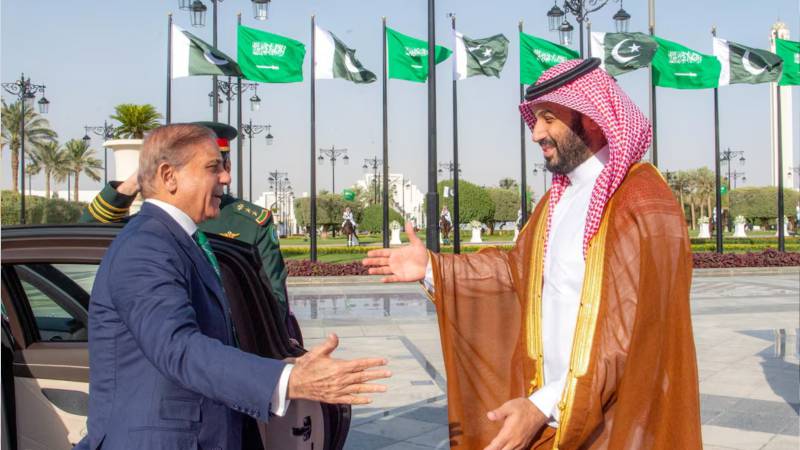Celebrations to Continue Until 23 September
The Pakistani government has directed that celebrations marking the recent defence agreement with Saudi Arabia should continue until 23 September, which coincides with the Kingdom’s National Day.
Prime Minister Shehbaz Sharif instructed that the festive illuminations in Islamabad, including the lighting of official and private buildings, remain in place until then. The decision reflects the symbolic importance attached to the pact, which both governments have described as a historic milestone in bilateral relations.
Capital Decorated in Saudi Colours
In the federal capital, prominent government offices, private buildings, and key intersections have been lit with green lights mirroring the Saudi flag.
Across the city’s Red Zone and main highways, large billboards have been installed featuring images of Saudi King Salman bin Abdulaziz, Crown Prince Mohammed bin Salman, Prime Minister Shehbaz Sharif, and Pakistan’s Army Chief, General Asim Munir.
Alongside these displays, hundreds of Pakistani and Saudi flags flutter on roadsides and rooftops, symbolising unity between the two countries.
Symbol of Strategic and Religious Bonds
Government sources said the extended celebrations are intended to showcase bilateral defence and strategic cooperation, while also boosting public awareness and enthusiasm.
Officials added that the festivities are a reflection of the historical and religious ties that bind the two nations. Pakistan has long considered its relationship with Saudi Arabia as a cornerstone of its foreign policy, with Riyadh often extending financial support during times of crisis.
Prime Minister Sharif said the celebrations embody the “deep-rooted brotherhood and partnership” that has defined Pakistan–Saudi relations for decades.
Public Reaction: Pride and Unity
The move has generated mixed but largely positive reactions among citizens in Islamabad and beyond. Many residents welcomed the gesture, linking it to wider hopes for regional stability and Islamic solidarity.
One resident told local media that protecting Saudi Arabia was an “honour” for Pakistanis, and that citizens were ready to make sacrifices for the security of the Muslim holy lands.
Another citizen expressed optimism, saying that at a time of growing regional tensions, stronger alliances among Muslim countries would enhance mutual protection and send a clear signal against external aggression.
Broader Context: Defence Pact Significance
The celebratory lights follow the signing of a historic defence pact between Pakistan and Saudi Arabia earlier this month.
The pact stipulates that an attack on either country would be treated as an attack on both, a move seen as formalising decades of military cooperation dating back to the 1960s.
Saudi Arabia has historically supported Pakistan financially, diplomatically, and through energy supplies. Pakistan, in turn, has provided military training and personnel to the Kingdom.
Analysts say the agreement not only strengthens bilateral security but also positions Pakistan as a key strategic partner for Riyadh amid wider Middle Eastern and South Asian instability.
Government Urges Peaceful Celebrations
Authorities have urged citizens to celebrate peacefully and maintain public order during the festivities.
Local administrations have been directed to ensure the safety of illuminated sites and manage large gatherings. Security agencies have been tasked with safeguarding public spaces and monitoring the celebratory events.
The government emphasised that while celebrations highlight the importance of the new pact, they must also reflect the discipline and unity expected from both nations.
Looking Ahead
The continuation of celebrations until Saudi National Day demonstrates Pakistan’s intention to publicly underscore the depth of its alliance with Riyadh.
As the region grapples with escalating conflicts, Islamabad and Riyadh appear determined to project solidarity and reassure their citizens of a shared commitment to security and cooperation.
For many Pakistanis, the illuminated skyline of Islamabad is more than decoration — it is a visible reminder of a partnership that spans religion, security, and mutual trust.















